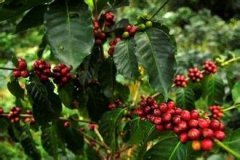History of Rwandan Coffee A brief introduction to the Origin of Rwandan Coffee
Rwandan coffee has been grown by Rwandans since colonial times, but until 1999, the product was classified as below C and sold on the global market.
Nobody cares. The reason for the poor quality is that farmers do not have a fixed procedure for cleaning coffee beans, and they do not process coffee fruits according to specifications in time. Buyers pay $0.33 a kilo for coffee beans, farmers subsist on meager profits from low prices, but remain poor.
In 1999, 220 coffee growers formed a union in the Malaba area (formerly part of Butare province) to address the problem. Many of its members are farmers separated from their loved ones by the 1994 massacre, and some have husbands jailed or brought before traditional gacaca courts to face trial on charges of involvement in the massacre. They named the guild Abahuzamugambi, which in Rwandan means "people working together to achieve goals." Farmers hope that by establishing this association, they can directly cooperate with Kigali exporters, instead of being stripped layer by layer through intermediary transportation companies, and thus increase their profits. Farmers divide their profits and spend them on tools, fertilizer, and seeds to increase production.
In 2000, the mayor of Maraba requested development assistance from the National University of Rwanda (UNR), located near Butare; the following year, UNR helped to establish the Partnership for Strengthening Agriculture in Rwanda (PEARL). PEARL is supported by several organizations: USAID, Michigan State University, Texas A & M University, and many Rwandan organizations, including the National University of Rwanda, the National Agricultural Laboratory (ISAR), and the Kigali Institute of Technology (KIST). In February 2001, PEARL began working with Abba Uzam Gambi to improve coffee quality to meet the standards of the U.S. specialty coffee market and sell coffee to the United States.
The first problem that Malaba coffee farmers solved was to set up a washing station. Coffee cherries must be transported to a washing station within twelve hours of picking to remove the sugar coating under the outer skin of the coffee beans, otherwise the flavor of the coffee will be greatly damaged. In July 2001, with funding from UNR, the Office des Cultures Industrielles du Rwanda (OCIR-Café), ACDI/VOCA and ISAR, they built the first cleaning station near the main road in Cyarumbo district. However, the washing station was not activated until late in the harvest season, so only 200 kg (441 lb) of the harvest was washed that year. However, the result was unexpectedly good. In 2002, the washing station was upgraded to provide more coffee processing. ACDI/VOCA was responsible for funding the construction of pipelines to bring in Mount Huye mineral water and help improve the efficiency of the cleaning station. The pipeline was commissioned in March 2002.
During the 2002 harvest season, Rwanda introduced a new certification system to ensure that coffee beans delivered to washing stations maintained proper quality. About half of Abba Uzamgambi's members are certified, enabling the cooperative to find buyers in specialized markets in Europe and North America.
Recognized by the world
Malabar beans are hand-picked and sorted according to quality
Malabar beans are hand-picked and sorted according to quality
PEARL brought coffee specialists to Rwanda, where it was responsible for maintaining contact with the seller, Community Coffee of Louisiana, USA, and sending samples to Louisiana. In June 2002, representatives of Public Coffee visited Malabar. At that time, the current President of Rwanda, Paul Kagame, stated on behalf of the Government the importance of this programme. Public Coffee bought 18000 kilograms (40000 pounds) of maraba beans for $3 a kilogram, above the market average. Coffee beans are shipped to Louisiana, where they are roasted and used in the company's fine coffee. It was also the first direct contract between an American roasting company and an African coffee cooperative.

Important Notice :
前街咖啡 FrontStreet Coffee has moved to new addredd:
FrontStreet Coffee Address: 315,Donghua East Road,GuangZhou
Tel:020 38364473
- Prev

Haitian pollution-free coffee
The Republic of Haiti is an island country in the northern Caribbean, which means a mountainous country in Indian. Haiti has a shortage of energy, backward industry and an economy dominated by agriculture. As one of the most materialistic regions in the world, Haiti is a world-renowned producer of coffee beans. Most of the coffee produced in Haiti is grown in a pure natural state.
- Next

Drinking a small amount of coffee every day can effectively prevent arterial thrombosis
Recently, a scientific team in South Korea has found that drinking a small amount of coffee every day can effectively prevent arterial thrombosis, BBC reported. Arterial thrombosis has been one of the direct causes of cardiovascular disease for a long time. The scientific team followed 25000 male / female workers who had had a physical examination all the year round. The survey found that male / female workers who drink 3-5 cups of coffee a day are receiving
Related
- Does Rose Summer choose Blue, Green or Red? Detailed explanation of Rose Summer Coffee plots and Classification in Panamanian Jade Manor
- What is the difference between the origin, producing area, processing plant, cooperative and manor of coffee beans?
- How fine does the espresso powder fit? how to grind the espresso?
- Sca coffee roasting degree color card coffee roasting degree 8 roasting color values what do you mean?
- The practice of lattes: how to make lattes at home
- Introduction to Indonesian Fine Coffee beans-- Java Coffee producing area of Indonesian Arabica Coffee
- How much will the flavor of light and medium roasted rose summer be expressed? What baking level is rose summer suitable for?
- Introduction to the characteristics of washing, sun-drying or wet-planing coffee commonly used in Mantenin, Indonesia
- Price characteristics of Arabica Coffee Bean Starbucks introduction to Manning Coffee Bean Taste producing area Variety Manor
- What is the authentic Yega flavor? What are the flavor characteristics of the really excellent Yejasuffi coffee beans?

